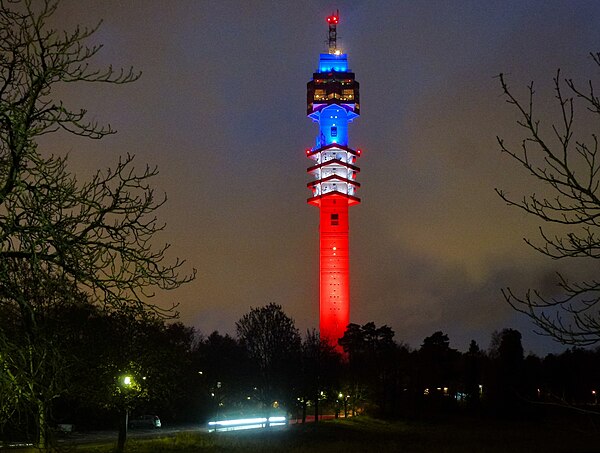Portal:Television
The Television Portal

Television (TV) is a telecommunication medium for transmitting moving images and sound. Additionally, the term can refer to a physical television set, rather than the medium of transmission. Television is a mass medium for advertising, entertainment, news, and sports. The medium is capable of more than "radio broadcasting", which refers to an audio signal sent to radio receivers.
Television became available in crude experimental forms in the 1920s, but only after several years of further development was the new technology marketed to consumers. After World War II, an improved form of black-and-white television broadcasting became popular in the United Kingdom and the United States, and television sets became commonplace in homes, businesses, and institutions. During the 1950s, television was the primary medium for influencing public opinion. In the mid-1960s, color broadcasting was introduced in the U.S. and most other developed countries.
In 2013, 79% of the world's households owned a television set. The replacement of earlier cathode-ray tube (CRT) screen displays with compact, energy-efficient, flat-panel alternative technologies such as LCDs (both fluorescent-backlit and LED), OLED displays, and plasma displays was a hardware revolution that began with computer monitors in the late 1990s. Most television sets sold in the 2000s were flat-panel, mainly LEDs. Major manufacturers announced the discontinuation of CRT, Digital Light Processing (DLP), plasma, and even fluorescent-backlit LCDs by the mid-2010s. LEDs are being gradually replaced by OLEDs. Also, major manufacturers have started increasingly producing smart TVs in the mid-2010s. Smart TVs with integrated Internet and Web 2.0 functions became the dominant form of television by the late 2010s. (Full article...)
Selected article -
"Goodbyeee", or "Plan F: Goodbyeee", is the sixth and final episode of Blackadder Goes Forth, the fourth and final series of British historical sitcom Blackadder. The episode was first broadcast on BBC1 in the United Kingdom on 2 November 1989, shortly before Armistice Day. Apart from the one-off short film Blackadder: Back & Forth made a decade later, it was the last episode of Blackadder to be produced and transmitted.
The episode depicts its main characters' final hours before a major British offensive on the Western Front of the First World War, and Captain Blackadder's attempts to escape his fate by feigning madness; after he fails to convince General Melchett, and Field Marshal Haig's advice proves useless, he resigns himself to taking part in the offensive. "Goodbyeee" has a darker tone than other episodes in the series, culminating in its acclaimed ending in which the main characters are assumed to have died. The episode's theme of death ties in with the series' use of gallows humour, its criticism and satire of war, and its depiction of authority figures contentedly sending their subordinates to face the enemy, while unwilling to do so themselves.
Selected image -

The Kaknäs tower (Swedish: Kaknästornet) is a TV tower in Gärdet in Stockholm, Sweden. It has 72 pillars. The tower is a major hub of Swedish television, radio and satellite broadcasts. It was finished in 1967, designed by architect Bengt Lindroos, and the height is 155 metres (509 ft) or 170 metres (560 ft) with the antenna included. The tower is owned by the national Swedish broadcasting company Teracom. The tower's name comes from the ancient name of the area, Kaknäs.
Did you know (auto-generated) -

- ... that Toshiki Seto was cast in the television adaptation of Senpai, This Can't Be Love! because, according to the creator, he could express emotion through his stare?
- ... that Milton Grant went from disc jockey and bandstand host to an owner of television stations?
- ... that in Bio's Bahnhof, a German live music talk show presented by Alfred Biolek in a former train depot, Kate Bush made her first television appearance?
- ... that Bell Labs' TD-2 microwave-relay system was used to carry television signals and telephone calls across North America?
- ... that Ernst Jacobi, known for portraying Gauleiter Löbsack in Volker Schlöndorff's film The Tin Drum, played more than 200 roles as a television actor?
- ... that 2 Cheap Cars withdrew a television advertisement in New Zealand because children were copying the main character's catchphrase, "Ah so", which they sometimes pronounced "asshole"?
Selected quote -
More did you know
- ...that The Simpsons and Philosophy: The D'oh! of Homer, a book that analyzes the The Simpsons using philosophical concepts, is the main textbook in philosophy courses offered at some universities?
- ...that Molly Badham, co-founder of Twycross Zoo, trained the chimpanzees who appeared in the long-running Brooke Bond PG Tips television advertisements?
- ...that model Albert Reed, selected to appear in September 2007 on the United States television show Dancing with the Stars, admits that he cannot dance?
- ...that Tomorrow's Pioneers, a television program for children produced by Hamas, features a mascot similar to Mickey Mouse?
- ...that Judy Morris, co-writer of the Academy Award winning Happy Feet has also acted in many of the most popular North American and Australian television programs since the age of 10?
Selected biography -
Daniel Louis Castellaneta (/ˌkæstələˈnɛtə/ KAST-ə-lə-NET-ə; born October 29, 1957) is an American actor and comedian. He is best known for voicing Homer Simpson on the animated series The Simpsons (as well as other characters on the show such as Grampa Simpson, Krusty the Clown, Groundskeeper Willie, Barney Gumble, Mayor Quimby, Sideshow Mel, Mr. Teeny, Santa's Little Helper, and Itchy). Castellaneta is also known for voicing Grandpa in Nickelodeon's Hey Arnold!, and has had voice roles in several other programs, including Futurama, Sibs, Darkwing Duck, The Adventures of Dynamo Duck, The Batman, Back to the Future: The Animated Series, Aladdin, Earthworm Jim, and Taz-Mania.
In 1999, he appeared in the Christmas special Olive, the Other Reindeer and won an Annie Award for his portrayal of the Postman. Castellaneta released a comedy album I Am Not Homer, and wrote and starred in a one-person show titled Where Did Vincent van Gogh? (Full article...)General images
News
- December 28: US professional wrestler Jon Huber dies aged 41
- September 2: Tributes paid to recently deceased US actor Chadwick Boseman
- May 24: Japanese professional wrestler and Netflix star Hana Kimura dies aged 22
- January 16: BBC newsreader Alagiah to undergo treatment for bowel cancer
- Upcoming events
Featured content
Main topics
History of television: Early television stations • Geographical usage of television • Golden Age of Television • List of experimental television stations • List of years in television • Mechanical television • Social aspects of television • Television systems before 1940 • Timeline of the introduction of television in countries • Timeline of the introduction of color television in countries
Inventors and pioneers: John Logie Baird • Alan Blumlein • Walter Bruch • Alan Archibald Campbell-Swinton • Allen B. DuMont • Philo Taylor Farnsworth • Charles Francis Jenkins • Boris Grabovsky • Paul Gottlieb Nipkow • Constantin Perskyi • Boris Rosing • David Sarnoff • Kálmán Tihanyi • Vladimir Zworykin
Technology: Comparison of display technology • Digital television • Liquid crystal display television • Large-screen television technology • Technology of television
Terms: Broadcast television systems • Composite monitor • HDTV • Liquid crystal display television • PAL • Picture-in-picture • Pay-per-view • Plasma display • NICAM • NTSC • SECAM
Categories
WikiProjects

|
You are invited to participate in WikiProject Television, a WikiProject dedicated to developing and improving articles about Television. |
- Main projects
- Sub-projects
Television Stations • American animation • American television • Australian television • British TV • BBC • Canadian TV shows • Television Game Shows • ITC Entertainment Productions • Digimon • Buffyverse • Doctor Who • Degrassi • EastEnders • Episode coverage • Firefly • Futurama • Grey's Anatomy • Indian television • Lost • Nickelodeon • The O.C. • Professional Wrestling • Reality TV • The Simpsons • Seinfeld • South Park • Stargate • Star Trek • Star Wars • Soap operas • Avatar: The Last Airbender • House
- Related projects
Animation • Anime and manga • Comedy • Comics • Fictional characters • Film • Media franchises
What are WikiProjects?
Things you can do

- Place the {{WikiProject Television}} project banner on the talk pages of all articles within the scope of the project.
- Write: Possible Possum
- Cleanup: color television, Alien Nation: Body and Soul, The Sopranos, Alien Nation: Dark Horizon, Alien Nation: The Enemy Within, Alien Nation: Millennium, Aang
- Expand: Timeline of the introduction of color television in countries
- Stubs: Flow (television), Just for Kicks (TV series), Play of the Month, Nova (Dutch TV series), More stubs...
Subportals
Related portals
Associated Wikimedia
The following Wikimedia Foundation sister projects provide more on this subject:
-
Commons
Free media repository -
Wikibooks
Free textbooks and manuals -
Wikidata
Free knowledge base -
Wikinews
Free-content news -
Wikiquote
Collection of quotations -
Wikisource
Free-content library -
Wikiversity
Free learning tools -
Wiktionary
Dictionary and thesaurus





























































